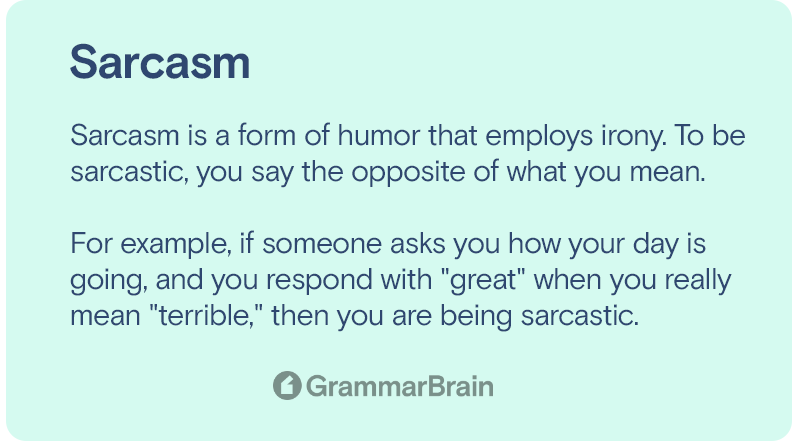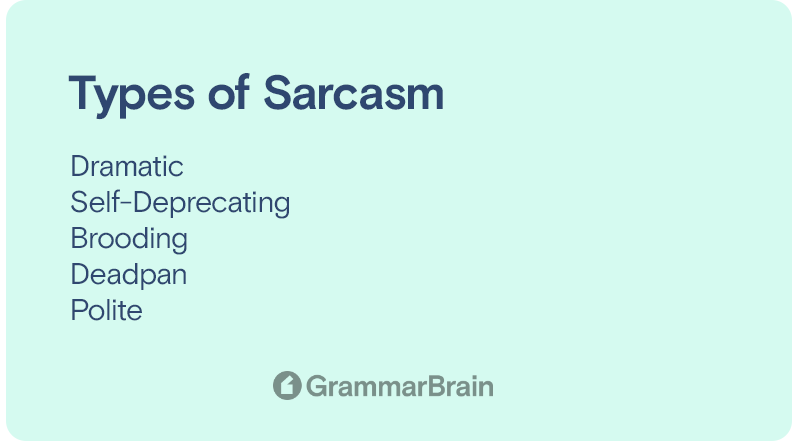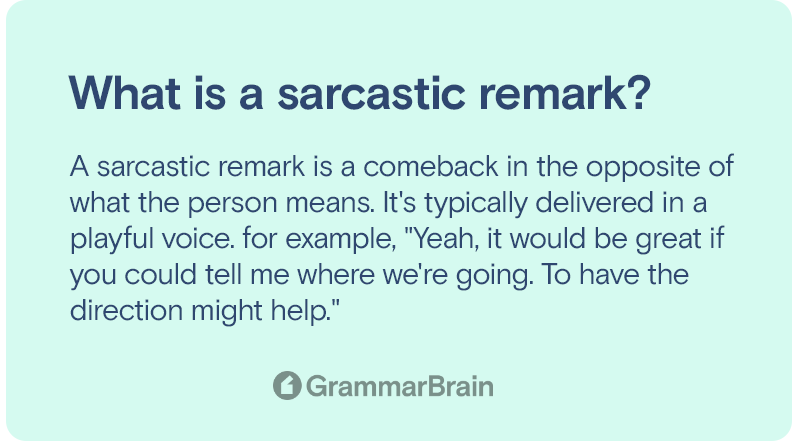What are examples of sarcasm? What are the various types of sarcasm? Sarcasm is a form of humor that can be difficult to understand if you’re not familiar with it. This short article will give you some examples of sarcasm so that you can start recognizing it when you see it or hear it.

What is sarcasm?
Definition of sarcasm
Sarcasm is a form of humor that employs irony. To be sarcastic, you say the opposite of what you mean.
For example, if someone asks you how your day is going, and you respond with “great” when you really mean “terrible,” then you are being sarcastic.
Sarcasm can be used to hurt someone’s feelings or to make them feel stupid. It can also show that you’re smarter than the other person. But it’s important to use sarcasm sparingly because it can easily offend people.
Sarcasm vs. verbal irony
Irony is a situation, character, or statement that is not what it seems to be. For example, if you say, “I’m so excited for our date tonight!” but then get stood up, your intent was ironic.
Sarcasm is a form of irony that is used to mock or insult someone. For example, if you say, “I can’t believe you’re such an idiot,” after they do something stupid, your intent is to insult them.
A primary way that sarcasm differs from verbal irony is the intent. The aim is to mock and satirize (when referring to sarcasm). Verbal irony involves saying the opposite of what the speaker originally intended.

Types of sarcasm
Dramatic Sarcasm
Dramatic sarcasm is when someone uses sarcasm for dramatic effects, such as to emphasize how bad a situation really is.
An example of dramatic sarcasm would be if someone said, “This is just great, I can’t wait to see what else goes wrong today.”
Self-Deprecating Sarcasm
Self-deprecating sarcasm is when someone uses sarcasm to make fun of themselves. This type of sarcasm can deflect criticism or make light of a difficult situation.
An example of self-deprecating sarcasm would be if someone said, “I’m such an idiot, I can’t even tie my own shoes.”
Brooding Sarcasm
Brooding sarcasm is a form of sarcasm that expresses dark or negative thoughts. This type of sarcasm is often used as a way to cope with difficult situations or to vent frustration.
An example of brooding sarcasm would be if someone said, “Life is just one big party, isn’t it?”
Deadpan Sarcasm
Deadpan sarcasm is when someone uses sarcasm without any change in their tone or facial expression.
This type of sarcasm can be difficult to detect because there are no visual cues to indicate that the person is being sarcastic.
An example of deadpan sarcasm would be if someone said, “That’s just great. I’m so happy for you,” in a flat, emotionless voice.
Polite Sarcasm
Polite sarcasm is a type of sarcasm used to be funny or make a point without offending the other person.
This type of sarcasm is often used in social situations where it would be considered rude to speak bluntly.
An example of polite sarcasm would be if someone said, “That’s just great, I’m sure you’ll do a fantastic job,” in a sarcastic voice but with a friendly smile.
Sarcasm examples
British sarcasm examples
- When someone asks how you are, you respond with, “I’m fine. Thanks for asking.”
- When someone sneezes, and you say, “Bless you.”
- When someone says they’re going to the gym, you say, “Good for you.”
- I’m not being funny, but…
- Do you want me to be honest or do you want me to be polite?
- I’m not angry, I’m just disappointed.
- Well, that’s a bit rich coming from you.
- You’re just jealous ’cause the other kids have got more friends than you.
- I cannot be friends with someone who doesn’t drink tea.
- I am such a poor cook that even boiling water would be a challenge for me.
- I like how loud you play your music.
- So do you know how to answer your phone?
Polite sarcasm examples
- I’m sorry I couldn’t make it to your birthday party, but I had a really important meeting that I couldn’t miss.
- That’s a really clever solution to the problem! (said with heavy sarcasm)
- Thanks for offering to help me move, it’s really appreciated! (said through gritted teeth)
- Oh, you’re going on vacation? Have fun! (said with obvious annoyance)
- I can’t believe you actually thought that was a good idea! (said in disbelief)
Deadpan sarcasm examples
- I’m not saying it was aliens, but it was aliens.
- I’m not saying I don’t like you, I’m just saying I don’t like you.
- Of course, I love you! But I also love pizza, which doesn’t mean I want to marry pizza.
- Yes, I ate all the cookies. What are you going to do about it?
- You know what they say: a calorie is a calorie.
Self deprecating sarcasm examples
- I’m not as smart as I look.
- I’m not as good at this as I thought I was.
- I’m really not that great.
- This is the best I can do.
- I’m just a simpleton.
Brooding sarcasm examples
- I just love spending time with my boss on Christmas eve going over meeting notes.
- I’m so grateful for my wonderful life.
- I can’t imagine anything better than this!
- What a great day!
- Isn’t it just amazing how perfect everything is?
Obnoxious sarcasm examples
- I’m so glad you’re doing well!
- Great job, you deserve a pat on the back!
- I can’t believe how successful you’ve become!
- You’re an amazing person, I’m so proud of you!
- You’re so smart, I don’t know how you do it!
- That was a brilliant suggestion, thank you for thinking of it!
- It’s really impressive how much weight you’ve lost!/you’ve put on!/you haven’t changed at all!
- Wow, your fashion sense has come a long way!
- You sound just like your mother/father.
Manic sarcasm examples
- Oh, I’m sorry. I didn’t realize I was speaking to an idiot.
- Are you really that stupid, or are you just pretending to be?
- Sometimes I wonder how you even manage to breathe without help.
- Do you have a learning disability or something?
- Are you sure that your brain is actually working properly?
- What were your parents thinking when they put you into this world?
- You’re about as sharp as a bowling ball.
- It’s a good thing your mother didn’t have a miscarriage, otherwise, you would’ve never been born and suffered such indignity.
Raging sarcasm examples
- Oh, I’m sorry, I didn’t realize I was talking to an IDIOT.
- I see you’re still learning how to use the internet.
- Well, aren’t you JUST a little ray of sunshine?
- I’m surprised your mother let you out of the house looking like THAT.
- You really should stop eating so much junk food.
- Maybe you should get more sleep.
- It sounds like you need to see a doctor.
- You’re such a pessimist!
- You’re just saying that because you’re jealous.
- Why don’t you go cry in a corner!

Sarcasm in literature
Sarcasm, sarcastic remarks, and sarcastic comments can all get seen in these books:
- Me Talk Pretty One Day by David Sedaris
- Good Omens by Neil Gaiman
- A Confederacy of Dunces by John Kennedy Toole
- Bossypants by Tina Fey
- Lucky Jim by Kingsley Amis
- Wishful Drinking by Carrie Fisher
FAQs
What is a sarcastic remark?
A sarcastic remark is a comeback in the opposite of what the person means. It’s typically delivered in a playful voice. for example, “Yeah, it would be great if you could tell me where we’re going. To have the direction might help.”
Does sarcasm appear in everyday speech?
Yes. The use of sarcasm is quite common in daily speech.
What is a sarcastic sentence?
A sarcastic sentence is a sentence that is meant to be funny, but that also has a hidden meaning that is different from what is being said.
For example, if someone says, “I’m so excited about our date tonight,” and you know that the person really doesn’t want to go on a date.
Sarcasm can be used to insult someone or to make fun of them, or it can be used to show that you disagree with them.
What is mild sarcasm?
Mild sarcasm is a form of humor that employs irony and biting wit but in a light and humorous way. It expresses disapproval or contempt without being overtly hostile or hurtful.
What is the opposite of sarcasm?
The opposite of sarcasm is sincerity. When you are sincere, you are genuine and honest in your communication. You mean what you say, and you say what you mean.
There is no hidden agenda or ulterior motive. Sincerity is a direct form of communication that comes from the heart.
Inside this article
Fact checked:
Content is rigorously reviewed by a team of qualified and experienced fact checkers. Fact checkers review articles for factual accuracy, relevance, and timeliness. Learn more.
Core lessons
Glossary
- Abstract Noun
- Accusative Case
- Anecdote
- Antonym
- Active Sentence
- Adverb
- Adjective
- Allegory
- Alliteration
- Adjective Clause
- Adjective Phrase
- Ampersand
- Anastrophe
- Adverbial Clause
- Appositive Phrase
- Clause
- Compound Adjective
- Complex Sentence
- Compound Words
- Compound Predicate
- Common Noun
- Comparative Adjective
- Comparative and Superlative
- Compound Noun
- Compound Subject
- Compound Sentence
- Copular Verb
- Collective Noun
- Colloquialism
- Conciseness
- Consonance
- Conditional
- Concrete Noun
- Conjunction
- Conjugation
- Conditional Sentence
- Comma Splice
- Correlative Conjunction
- Coordinating Conjunction
- Coordinate Adjective
- Cumulative Adjective
- Dative Case
- Determiner
- Declarative Sentence
- Declarative Statement
- Direct Object Pronoun
- Direct Object
- Diction
- Diphthong
- Dangling Modifier
- Demonstrative Pronoun
- Demonstrative Adjective
- Direct Characterization
- Definite Article
- Doublespeak
- False Dilemma Fallacy
- Future Perfect Progressive
- Future Simple
- Future Perfect Continuous
- Future Perfect
- First Conditional
- Irregular Adjective
- Irregular Verb
- Imperative Sentence
- Indefinite Article
- Intransitive Verb
- Introductory Phrase
- Indefinite Pronoun
- Indirect Characterization
- Interrogative Sentence
- Intensive Pronoun
- Inanimate Object
- Indefinite Tense
- Infinitive Phrase
- Interjection
- Intensifier
- Infinitive
- Indicative Mood
- Participle
- Parallelism
- Prepositional Phrase
- Past Simple Tense
- Past Continuous Tense
- Past Perfect Tense
- Past Progressive Tense
- Present Simple Tense
- Present Perfect Tense
- Personal Pronoun
- Personification
- Persuasive Writing
- Parallel Structure
- Phrasal Verb
- Predicate Adjective
- Predicate Nominative
- Phonetic Language
- Plural Noun
- Punctuation
- Punctuation Marks
- Preposition
- Preposition of Place
- Parts of Speech
- Possessive Adjective
- Possessive Determiner
- Possessive Case
- Possessive Noun
- Proper Adjective
- Proper Noun
- Present Participle
- Prefix
- Predicate



